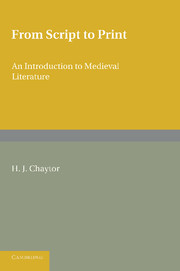Book contents
- Frontmatter
- Dedication
- Contents
- Preface
- Miscellaneous Frontmatter
- Chapter I Introduction
- Chapter II Reading and Writing
- Chapter III Language and Nationality
- Chapter IV Style and Criticism
- Chapter V Prose and Translation
- Chapter VI Publication and Circulation
- Chapter VII Conclusion
- Appendices
- Appendix A
- Appendix B
- Appendix C
- Appendix D
- Index
Appendix D
from Appendices
Published online by Cambridge University Press: 05 June 2016
- Frontmatter
- Dedication
- Contents
- Preface
- Miscellaneous Frontmatter
- Chapter I Introduction
- Chapter II Reading and Writing
- Chapter III Language and Nationality
- Chapter IV Style and Criticism
- Chapter V Prose and Translation
- Chapter VI Publication and Circulation
- Chapter VII Conclusion
- Appendices
- Appendix A
- Appendix B
- Appendix C
- Appendix D
- Index
Summary
Textual criticism, in the modern sense of the term, is usually considered to have been founded by the work of Karl Lachmann (1793-1851); he was chiefly occupied with classical and Old or Middle High German texts, though he also produced an edition of the New Testament in 1842. To the end of the eighteenth century critics were employed chiefly in discovering MSS. and in recording variant readings; they were inclined to rely upon the principle that in the multitude of counsellors is wisdom and, in the case of Biblical literature, to accept any reading supported by a considerable number of MSS., provided that it did not contradict theological orthodoxy. This was the only principle that governed the editing of classical texts; the preface, for instance, of H. A.J. Munro's edition of Lucretius describes a state of uncritical muddle which may be regarded as typical of the ages before Lachmann. Lachmann showed the possibility of classifying MSS. in families by noting the variants or mistakes common to particular MSS.; the obvious inference followed, that the antiquity of a MS. was an important factor in the estimate of its evidential value, and that the coincident testimony of two different groups was more cogent than that of one. The use of such metaphorical terms as 'family' and 'affinity* naturally suggested the idea of genealogy; and editors were expected to produce a genealogical tree, showing their conception of the relations between the MSS. in which the works which they studied had been transmitted, and justifying the choice of those MSS. on which the texts were to be based.
- Type
- Chapter
- Information
- From Script to PrintAn Introduction to Medieval Literature, pp. 148 - 152Publisher: Cambridge University PressPrint publication year: 2013



